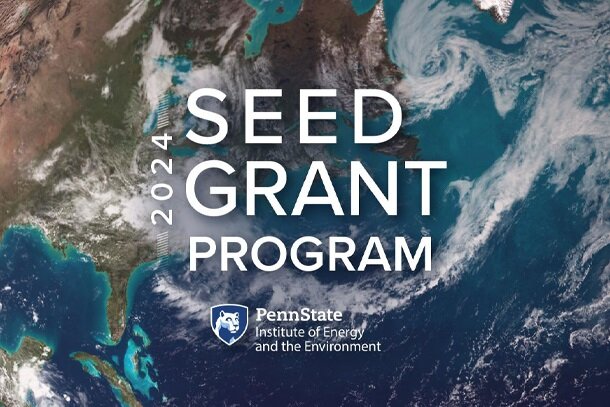
Six interdisciplinary research teams with investigators from the College of Engineering have been awarded funding through the Institute of Energy and the Environment’s Seed Grant Program for 2024. Credit: Brenna Buck/Penn State
Engineering investigators awarded seed grants by Institute of Energy and the Environment
June 6, 2024
Editor’s note: A version of this news release was first published by Penn State News.
UNIVERSITY PARK, Pa. — Six interdisciplinary research teams co-led by researchers from the College of Engineering have been awarded funding through Penn State's Institute of Energy and the Environment’s (IEE) Seed Grant Program for 2024. The goal of the program is to foster basic and applied research that addresses IEE’s five research themes. Additionally, in recognition and support of the launch of the Penn State Climate Consortium, the 2024 call required all proposals to have a climate-related connection.
“The Penn State Climate Consortium demonstrates the University's commitment to improving our planet by addressing climate change, the most pressing issue of our time with global societal implications," said Bruce Logan, IEE director and Evan Pugh University Professor and Kappe Professor of Environmental Engineering. "Recognizing this urgency, IEE issued a call for proposals that seek to create new collaborations and research efforts to develop solutions. This initiative goes beyond just addressing climate change. The aim is to mitigate climate change’s impact on our communities and economies, which will pave the way for a more sustainable and just future."
The projects that include investigators from the College of Engineering are listed below. A full list is available online.
-
“A Spatiotemporal Analysis of Community Power Outage Impact Under Extreme Weather” will study how power outages affect homes and people during extreme weather, considering factors like building types, resident demographics and resident behaviors, to help communities prepare better. Investigators: Yuqing Hu, College of Engineering; Guangqing Chi, College of Agricultural Sciences
-
“Developing Nonreciprocal Thermal Emitters for Renewable Energy Harvesting” aims to develop special materials that emit heat in one direction but not absorb heat in the same direction, which could improve the efficiency of solar cells and other renewable energy technologies. Investigators: Linxiao Zhu, College of Engineering; Stephanie Law, College of Earth and Mineral Sciences; Zhiqiang Mao, Eberly College of Science
-
“Development and Social Implications of CO2-Negative Bioproducts Derived from Crop Residues for On-site Energy and Decarbonized Cement Production” aims to turn farm waste into a carbon dioxide-absorbing material for cement production, helping farmers while addressing climate change. Investigators: Juan Pablo Gevaudan Burgos, College of Engineering; Kaitlyn Spangler, College of Agricultural Sciences
-
“Equitable Optimization of Transportation Systems and Services to Address Climate and Sustainability Challenges” aims to leverage artificial intelligence (AI) to optimize transportation networks and services, aiming to achieve significant reductions in energy consumption and pollution within urban environments. Investigators: Aron Laszka, College of Information Sciences and Technology; Vikash Gayah, College of Engineering; Ilgin Guler, College of Engineering
-
“Protecting the Amazon Rainforest from Oil Exploitation: Combining Indigenous Body-Territory Epistemology with Environmental Monitoring to Empower Local Conservation Efforts” will work with Indigenous people in the Amazon rainforest to combine their knowledge of the land with science to create a detailed map showing how oil extraction has polluted the water and soil. Investigators: Belén Norona, College of Earth and Mineral Sciences; Rachel Brennan, College of Engineering
-
"Visualizing Inland Flood Hazard in the Face of Climate Change” will create realistic 3D flood visualizations to better show communities the dangers of future flooding and failing levees due to climate change. Investigators: Kaleigh Yost, College of Engineering; Cibin Raj, College of Agricultural Sciences; Peter Stempel, College of Arts and Architecture; Alfonso Mejia, College of Engineering
For more than 10 years, IEE has provided critical funding for researchers to develop new interdisciplinary research teams and position them for high-impact research and substantial external funding success. Since 2016, the IEE Seed Grant Program has resulted in more than $60 million in external funding from government agencies, non-profit organizations and industry, a 12:1 return on investment.
More than funding, the IEE Seed Grant Program cultivates a collaborative learning environment. It fosters teamwork and leadership by bringing together senior and junior faculty, postdoctoral researchers and graduate students. Through these projects, participants gain mentorship and expertise, ultimately developing into well-rounded researchers poised to lead future interdisciplinary teams.
The Institute of Energy and the Environment connects and supports interdisciplinary teams of researchers that are solving some of the world’s most difficult energy and environmental challenges. For more information about the seed grant program or the Institute of Energy and the Environment, visit iee.psu.edu.

